I sat down with Jimmy Maize to hear more about his background and the unique perspective he brings to the HJT community. Jimmy is an alumnus of Whitman and, having majored in Theatre, finds HJT in familiar form. After visiting as a guest artist to direct Camino Real in fall 2012, he returns to Whitman as the Johnston Visiting Assistant Professor of Theatre. He is also a member of Tectonic Theater Project and teaches the company’s brand of devising, Moment Work, both nationally and internationally. The interview that follows provides great insight into John Muir Wolf, his extensive research of the play’s main subjects, OR-7 and John Muir, and how the Tectonic Theater Project continues to shape his work today.
Jacob Frei interviewing Jimmy Maize III for the HJT Blog
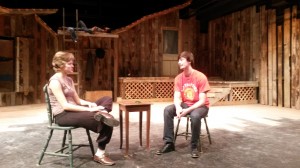
I ask Jimmy if he minds that I record the conversation. He’s struck by a memory of his own research on OR-7 and wolf depredation that would eventually inspire a scene in the play:
JM: There’s a scene in the play about the awkwardness of recording something as an interview. It’s the only verbatim text in the play. It’s in the top of Act II where I interview a man who’s actually coming to opening night, named Rob Klavins. And he’s an environmental conservationist and advocate on behalf of wolves. I saw his name pop up all the times I did my research about OR-7 and so I had to talk to this guy. He lives in Joseph, OR so I just drove down the rode and met with him.
JF: How has the Tectonic Theater Project and your work with them shaped the way you see theater?
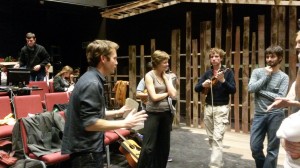
JM: Yeah, hugely. I came across their work during the latter half of the time I was at Whitman and the play, The Laramie Project, was their big success that reached me. It was my first love of what documentary theater could do in a social activism way – a way to affect social change. We’re interested in finding new forms and theatrical languages. Everything we explore is about using the tools of theater in a way that’s uniquely theatrical and that is pushing the form forward and not relying on old forms like realism and naturalism, which are 19th Century forms. TV and movies do that so much better. I started questioning that and finding that Moment Work sparked me as a way to push the form forward and reclaim it as relevant. I wrote my thesis on documentary theater, which included Moisés Kaufman and the Tectonic Theater Project in a chapter. [He] has had a huge influence in crafting the work that I do and the questions I ask. And it [the Tectonic Theater Project] is my artistic home in New York still. It’s basically in my DNA now.
JF: It’s like building a new language then. What does Moment Work add to a production that other methods might not be able to?
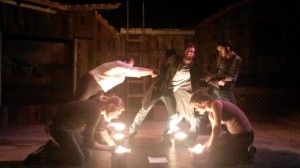
JM: Moment Work… looks at theatre from more of a structuralist point of view. All of the elements of the stage – props, costumes, light, bodies, the architecture, and everything that you see on the stage have an inherent narrative capacity…. And often times we start with the text as a framework and see how all these other elements can serve the text – but that’s limiting the strengths of theatre. If you start with not limiting yourself to just the text, and start working with props, lights, music etc., then maybe there is a way or a poetry within those other elements that can tell story, and text can just be one of those elements. It sort of democratizes storytelling on stage. [This idea] comes from the 60’s – from a deconstruction aesthetic. But I would say that Moment Work places a higher value on narrative….
JF: In every instance of using Moment Work would you work with other elements before the script is written? Or could you actually write a script first and then do the work with the other elements after?
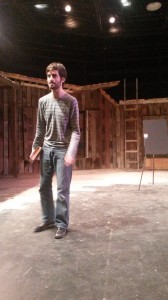
JM: You can, yeah. I did a little bit of Moment Work when I was here last time directing Camino Real [in 2012]. We found lots of excellent ways to tell story with that text that was not reliant on the words themselves. So absolutely, you can use Moment Work with already-generated texts. Or you can use it as a way to organize texts or as a way to create text.
I actually don’t call [John Muir Wolf] devised work — I would say it’s ensemble-driven. Some of the narrative is devised, but ultimately the text comes from research. I did two years of research and collected all of this text and maybe even had an idea of what the story arc would be before coming into rehearsal. I just didn’t [compile] a script because that would’ve limited a lot of our choices and basically put us into a path of pure rehearsal of [the script]. But having two-and-a-half weeks of just exploring Moment Work around the themes… actually changed some of the ideas that I had about how to organize the text. I wanted to cast it and know who I was working with and what our strengths were before I fully knew what the play could be.
So I had one day where everyone came in and had done a little bit of research on some of the modern-day OR-7 story, and they each presented a character that they had found. It didn’t matter about gender or about age. They came in and were that person and talked extemporaneously as that person in front of us. When they were done, we had a Q and A where we asked that character questions and they would just spitball. And I took notes about speech patterns and what those actors… brought to the table…. And I was able to write the modern-day characters tailor-made for them. That would not have happened… had I tried to cast accordingly to something I had already written.
JF: What would be an example of something that you found from working with the cast that you wouldn’t have found or wouldn’t have been able to do if there was that stringent framework of a script?
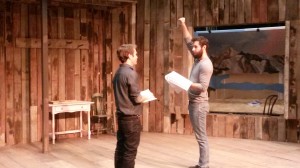
JM: I wouldn’t have been able to write as deeply, idiosyncratically, or as human had I written them all in my voice or a pre-conceived voice. One of the elements of the stage is virtuosity: what can you do that most people can’t do? So we had this show-and-tell and we went down the line and presented to each other what we can do. Some people can sing, some people can play the guitar; I learned that Haley is just a crazy good hula-hoopist. And so using those [endogenic things] deepened everyone’s investment in the play – I think as you wrote in your blog … and as Matthew said, it gives everyone a sense of contribution and ownership. In rehearsals there are now moments that are being managed by them and I don’t always know what’s going on. I ask, ‘who’s carrying this prop?’ or ‘what do you do at this moment?’ I’ve outsourced a lot of that problem solving to the ensemble because now they’re in essence co-creators of that moment. It’s somewhat nerve-wracking and wonderful at the same time when I say something like, ‘guys I’m on the same level [as you]. Can you figure it out?’ (he laughs) And they now work like a well-oiled machine… to figure out how to get this moment happening or how to work that transition and I can’t tell you how sane it makes everyone to not rely on one dictatorial voice within the room. And I think it also – and you’ll see it – creates a real cohesion on the stage that is palpable when you watch it. I feel like everyone is (he snaps) in sync.
JF: You said that you researched for two years. What sort of unusual or interesting things did you find out about John Muir?

JM: A lot. Primarily I knew that he had this mentor Jeanne Carr. They communicated all their lives, but I’m focusing on their relationship in a way that fleshes out what was not in the document. They were eleven years apart and she was already married but they may have been something more were it not for those limitations. So there’s definitely something more for us to follow. Some people may take umbrage with extrapolating [that narrative]. You run into dubious ethical grounds sometimes, and you just have to go back to the historical account and make sure you aren’t making revisionist history.
…[Muir’s] decision to come down off the mountain… would be the core climactic event of the play. [Carr] was like: ‘you need to live more amongst men. You need to share that experience.’ She was his John the Baptist. She saw the legacy and the possibility in him. She advocated that he go [to Yosemite] but also that he come back into civilization. And were it not for her, there might not be a John Muir as we know him. He may have lived out an existence much the way that OR-7 would have if he hadn’t been collared. That’s – without the spoiler alert – one of the main thematic ties between this material.
JF: It seems like music is also a large part of the show. How do you see that adding to the production?
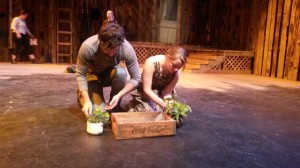
JM: I always think, if not music, then sound is my first entry point into the material. I’m also a sound designer and put these songs together. Just thinking about a play aurally is very important to me. It’s one of the reasons I like to read Shakespeare and I think about rhythms and tones a lot and the way that sound works subliminally on people. So, music – and folk music primarily – I knew was always going to be a heavy thread in this. Music… unifies everyone in the audience and on stage. We aren’t all trained musicians in the show or trained singers, but people aren’t always trained when they sing folk songs. That’s the point of folk songs – to sing them as a collective unifying force. And the first scene is around a campfire and for that reason – because it’s something otherworldly.
One of the inherit problems of this play is ‘how do you create a play about nature inside of a black box theater?’ The whole point about John Muir was that in the play and in his life he delays writing books because as he says, ‘a cartload of books isn’t worth one walk in the woods.’ We’re going into a theater to watch a guy who hated writing down the experience of nature because you had to go walk [through it]…. Truly, how do you even approximate what he’s trying to describe if you’re already trying to deal with it in that ironic sense? So I think music gets us as close to a spiritual sense of nature that you can in a theater; way more so than if I were to make a hyper-realistic nature set. It would still be fake, but music is not only not fake; it accesses something primal and universal the same way that nature does. So in a way music is the nature of this show.
And they’re all spiritual songs, too. I’ve chosen the songs primarily because the content not only refracts Muir’s journey but it has to do with a spirituality that Muir was after, in a way that is not dogmatic in any sense. It’s about a god that exists in nature and in us that ties us to each other and to nature, and music does that as well.
———————————————————————————————————————————————————————————————————
John Muir Wolf opens in the Freimann Studio Theatre Wednesday, November 12th. Please stop by the box office from 9:30-12:30 and 12:30-4:00, Monday-Friday for tickets. Or call: (509) 527-5180.
Show times: Wednesday, November 12th @ 8pm, Thursday, November 13th @ 8pm, Friday, November 14th @ 8pm, Saturday, November 15th @ 2pm, Saturday, November 15th @ 8pm (SOLD OUT), & Sunday, November 16th @ 2pm
I don’t think the title of your article matches the content lol. Just kidding, mainly because I had some doubts after reading the article.